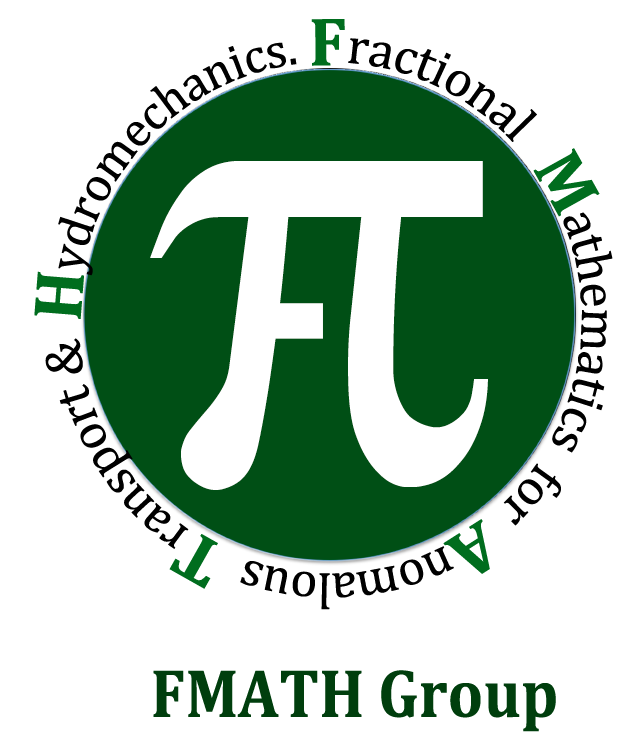FMATH Group

Welcome to FMATH Research Group
FMATH is a research group of graduate and undergraduate students at Michigan State University, led by Dr. Mohsen Zayernouri. The overarching theme of research in FMATH is to bring to bear advanced computational tools from applied mathematics and data sciences to develop predictive simulation tools for challenging engineering problems, including: stochastic Lévy processes in turbulent flows, shock and interface problems in reacting and multi-phase flows, anomalous transport in porous and disordered materials, sub-/super-diffusion processes in the human brain, and complex bio-materials and tissue engineering. The main thrust of research in FMATH is on stochastic fractional-order modeling, numerical analysis, computational fluid dynamics, data-driven algorithms and high-performance computing.
Recent Publication
Spectral and Spectral Elements Methods for Fractional Ordinary and Partial Differential Equations
Authors: Mohsen Zayernouri, Li-Lian Wang, Jie Shen, George Em Karniadakis
Description: This comprehensive introduction to global spectral methods for fractional differential equations from leaders of this emerging field is designed to be accessible to graduate students and researchers across math, science, and engineering. The book begins by covering the foundational fractional calculus concepts needed to understand and model anomalous transport phenomena. The authors proceed to introduce a series of new spectral theories and new families of orthogonal and log orthogonal functions, then present corresponding spectral and spectral element methods for fractional differential equations. The book also covers the fractional Laplacian in unbounded and bounded domains and major developments in time-integration of fractional models. It ends by sampling the wide variety of real-world applications of fractional modeling, including concentration transport in surface/subsurface dynamics, complex rheology and material damage, and fluid turbulence and geostrophic transport.
Publication Details:
- ISBN-10: 1108490999
- ISBN-13: 978-1108490993
- Edition: 1st
- Publisher: Cambridge University Press
- Publication date: November 14, 2024
Research Overview
In FMATH, we conduct fundamental, innovative, and multi-disciplinary research with the following research thrusts (RTs) and engineering applications (EAs):
Funded Developmental Research Thrusts (RTs):
Relevant Funded Engineering Applications (EAs):
Research Projects
Phase-Field Based Machine Learning Framework for Failure Prediction
Failure prediction is utterly important in the design of mechanical components, and yet, it is a rather difficult task. Early failure detection and prevention can potentially save millions of dollars in the life-cycle of products. With that objective, we construct a Machine Learning framework for data-driven failure prediction in damage models, applied to standard-to-anomalous materials. Using pattern recognition, classification algorithms and uncertainty quantification, we can detect the presence and location of failure with robustness, even with noise-polluted data.
Fractional Turbulence Simulation & Modeling
Scalar mixing by a turbulent flow is of interest to model pollutants dispersion, reactive flows, and industrial processes. Due to the anomalous features of turbulence, we propose a new stochastic framework of turbulence modeling by employing fractional PDEs as an Eulerian approach to incorporate the nonlocal effects. There is a great consistency between the Lagrangian and Eulerian fractional modeling of scalar dispersion in the context of an isotropic turbulent flow. We are also extending the idea to model the memory effects in turbulent mixing.
Data-/Design-Driven Modeling of Transport/Materials
Construction of mathematically sound model forms for the life-cycle of a broad range of existing, and yet-to-be-developed complex materials (soft materials, bio-tissues, bio-mimetic materials). When subject to thermo-mechanical loads, these materials undergo non-Fickian diffusion processes in their ordered/disordered micro-structure, which leads to a stochastic power-law scaling observed in visco-elastic stress relaxation, plasticity, damage/aging and failure. In order to capture such effects, we make use of fractional visco-elasto-plastic models, and leverage their potential using generalized distributed-order models, describing the evolving aforementioned effects in the context of small to large strains.
Stochastic Computational Fluid Dynamics and UQ
In the life-cycle of complex materials, randomness is present and is propagated throughout the space and time scales. In additive manufacturing, the input parameters highly influence the thermo-fluid processes, such as the cooling rates, which lead to uncertainties in the final form of the microstructure, and consequently the material properties. In this sense, we mitigate and propagate these model uncertainties in manufacturing from micro- to macro-scale, allowing us to determine the uncertainty and reliability of the fractional operators. This aids in the selection of the appropriate constitutive model forms for describing visco-elasto-plastic behavior with damage/fatigue, and also allows better description of the uncertainty bounds of material properties and probability of failure in such materials.
Operator-Based Uncertainty Quantification
Operator Based Uncertainty Quantification (OUQ) is a crucial concept in the realm of complex materials and additive manufacturing processes. It addresses the inherent randomness present in these processes, which affects the material's microstructure and, subsequently, its properties. Operator-Based Uncertainty Quantification involves a methodical approach to dealing with these uncertainties. By understanding and modeling the randomness at various scales, researchers can propagate these uncertainties effectively. This propagation process allows for the determination of uncertainties and reliability associated with fractional operators, which are essential mathematical tools used in describing complex behaviors in materials.
Numerical Analysis of Fractional PDEs
Development of spectral collocation methods for time- and space- fractional differential equations (constant, variable and distributed orders), and fast time-fractional multi-step integration schemes with lower computational complexity to allow the application of FPDEs to large-scale systems. We also develop spectrally-accurate schemes for fixed-to-distributed order fractional partial differential equations in time and space and also fast time-fractional multi-step integration schemes with lower computational complexity to allow the application of FPDEs to large-scale systems.
Acknowledgement
FMATH Gratefully Acknowledges the Financial Support From these Organizations and Agencies: